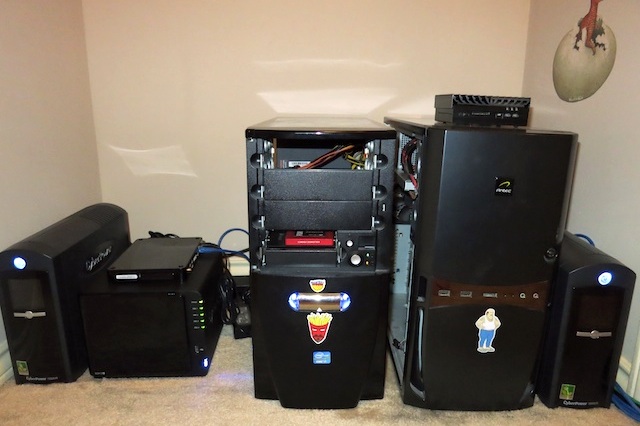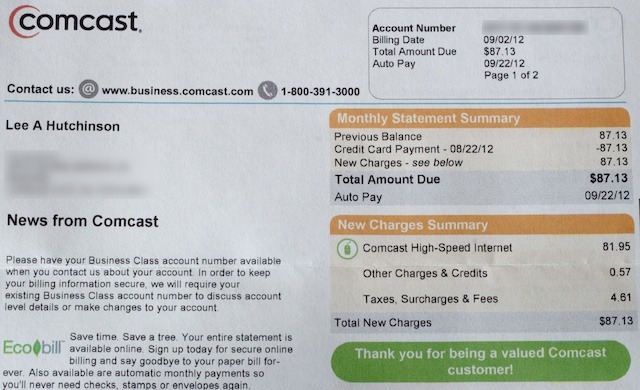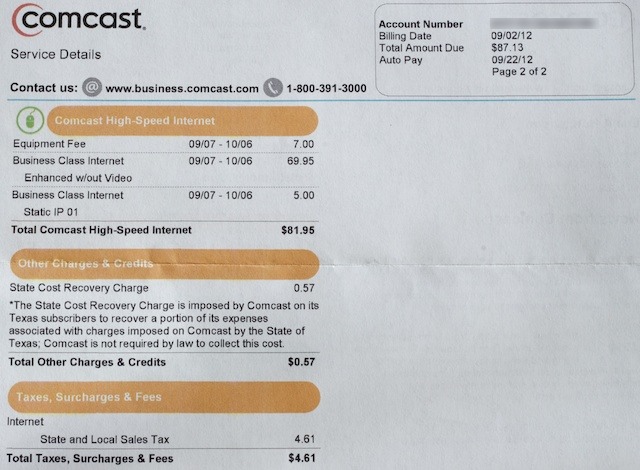
Compared to other advanced countries, high-speed Internet access in the US is in notoriously sorry shape, with high bills and low customer satisfaction. Even as commercials exhort customers to download music and stream movies, most ISPs are implementing data caps. Netflix and other movie-on-demand services are among the most popular online destinations, accounting for almost 30 percent of peak-time Internet traffic in North America, but using Netflix every night can bump a customer right up against their ISP's download cap.
Hosting your own game or Web server can also run afoul of ISP restrictions, either because ISPs block the ports you want to use or because running servers on a home connection violates the ISP's terms of service.
And computers and portable devices with ridiculous amounts of storage and processing power mean that everyone is creating content to share, but tiny upload pipes make that sharing unreasonably difficult.
But there is another way—a way to get vastly improved customer service experience and a connection free of caps and other restrictions. It simply requires that you participate in that grand old American tradition: voting with your wallet.
Most ISPs offer several grades of "business-class" Internet connections, intended for use by companies large and small. The prices can spiral up into thousands and tens of thousands of dollars per month for large businesses, but ISPs typically have offerings for small companies that don't cost much more than standard consumer Internet connections. They come with some additional benefits that might be of particular interest to the rabid Netflix watcher or the would-be home server admin, and nothing prevents ordinary folks from signing up. But is business-class Internet worth the money? That all depends on what kind of user you are. For me, it's essential.
The bennies
Let's run through the main features found in business class connections as compared to consumer connections.
No caps. Most major ISPs impose a per-month limit on the total amount of data you can download (out of the four we talked to, only Verizon's FIOS service lacked a cap). ISPs claim this allows them to manage traffic on their networks and keep any one person from using more than his or her "fair share" of the available bandwidth. The cap is typically at least 250GB per month, but it's becoming more common for customers to hit that mark, especially in households with several heavy Internet-using occupants. This results in a nastygram from the ISP or extra charges; repeat offenders might even find themselves disconnected.
Across the board, business-class connections lack bandwidth caps. They are still monitored for "suspicious" or "excessive" usage—you wouldn't want to run the next Megaupload out of your closet—but worrying about your monthly download quota is no longer necessary. Netflix and Amazon Prime Video fans can stream to their heart's content without worrying about receiving a letter from their ISPs.
Unblocked ports. Most ISPs firewall some inbound and some outbound requests on common low-order TCP ports. Some of this blocking is for security—for example, most ISPs block TCP port 25, the default port that SMTP servers use to send e-mail. This helps control the torrent of spam spewed by customers' malware-infected PCs. However, a business might want to be able to send and receive e-mail directly, and so business-class connections lack these port restrictions. Similarly, the terms of service on a residential account often forbid users from running servers of any kind, but businesses might want to self-host websites. Business-class accounts have few, if any, restrictions on running servers.
Static IP addresses. This is especially useful if you want to run a server. The prevalence of dynamic IP addresses among residential customers has led to many workarounds for folks who want to assign a domain name to their changing public IP addresses, but a static IP address makes such workarounds unnecessary. If you're going to run a Web or gaming server from your closet, it's extremely helpful to have a static IP address, since you can slap a domain name onto it and never have to worry about keeping up with dynamic DNS reassignment services.
Tech support. Calling an ISP's technical support line can be a horrible, frustrating experience. Understanding that businesses are on the hook for more money than consumers and that they need reliable support, ISPs treat business-class accounts far better. All ISPs have separate support lines for business-class customers; some, including Comcast, actually assign dedicated account representatives, eliminating the need to wait in the phone queue for most questions. In addition, business-class customers usually get priority over residential customers when scheduling technician visits.
The extras. Finally, ISPs have a raft of value-added services available to business-class customers. Some offer dozens of e-mail inboxes and free domain name registrations; most also offer Web hosting, an antivirus service for multiple computers, and some kind of collaboration software like Microsoft Sharepoint. These add-ons are of questionable value to home users, but they definitely have their place when viewed in the context of their intended market.
The price
So how much do these upgraded services cost? It depends on who your ISP is, where in the country you are, and how fast of a connection you want. I can relate my own anecdotal experience with Comcast in the Houston area, as I've been a business-class user for a couple of years now. My bandwidth is 16 megabits down and 2 megabits up, and I have a single static IP address. I'm not under contract. Here's my bill:


The service itself is $69.95. A single static IP and the required equipment rental for the SMC 8014 NAT router add another $12, and taxes and fees round out the bill to a total of $87.13 every month. This is without cable TV (I proudly cut the cord more than ten years ago) or VoIP telephone service; bundling services together can lower your overall bill just as it can with a regular consumer connection.
Pricing for business class Internet, unfortunately, is notoriously tricky to pin down. The tier of service I'm at doesn't even appear on Comcast's list of business-class plans, which range from $59.95 per month for 12Mbps down/2Mbps up all the way up to $369 per month for 100Mbps down/10Mbps up. The story with other national ISPs is similar. Cox's packages vary by region, with its "Select" tier (10Mbps down/2Mbps up, an included static IP address, and several other value-added features) priced at $59.95 per month in Cleveland but $103.00 per month in Arizona. We asked Cox about this variance, which appeared to be the largest among the ISPs examined, and they replied that regional prices are set by "local market dynamics," which include the price of competitors' services.
If you're lucky enough to have Verizon FiOS in your area, the starting price isn't bad at all, with its packages page showing $64.99 per month for 15Mbps down/5Mbps up; however, if you want a static IP address you'll pay a minimum of $104.99 per month for a 25Mbps symmetrical connection.
AT&T U-verse's business-class site is scant on details, but pricing ranges from $40 a month for 1.5Mbps down/1.0Mbps up to $100 a month for 24Mbps down/3Mbps up.
From the horse's mouth
Ars spoke with representatives from four large national ISPs: Comcast, Cox, Verizon, and AT&T. Each ISP pointed out the value of business-class services to businesses, but all four were hesitant to recommend them for a regular home user.
Roger Crisman, the marketing director for Cox Businesses Internet Services, noted that data from IDC shows that 50 percent of businesses in the US are home-based, and said that Cox's business-class offerings are designed to appeal to folks working out of the home. The prime differentiator he sees between home and business-class services is the support—Cox doesn't outsource business-class support, so when business-class customers call in for help, they can speak directly to a Cox employee. He also noted that extra features like online backup, cloud storage, and the Cox-branded McAfee Security Suite are designed to help out businesses too small to have their own IT support staff; this would obviously include home businesses.
Services aside, the lack of download caps and the unblocked ports are particularly appealing to power users, and Ars asked if Cox was seeing any uptick in business-class service adoption among home users who aren't running businesses and just want the extra features. Crisman replied that they weren't seeing any significant trends in that direction. Although IDC's data shows a huge number of home-based businesses, only about 10 percent of Cox's business-class connections are home business users—suggesting that most small home businesses use consumer accounts.
AT&T's Jim Gewecke, director of Small Business Product Management, did note that AT&T is seeing an uptick in business-class service adoption in homes, though not necessarily among regular folks looking for additional service and support. "While we can't disclose specific numbers or percentages," he said in an e-mailed statement, "more and more we're seeing home-based small businesses, telecommuters, and other work-from-home employees use AT&T services to ensure they have the connectivity they need to be productive."
Switching
For me, going business class makes sense. I get a lot of mileage out of my static IP and my unblocked ports—I have no fewer than four Linux servers in my closet and I host both a personal website and The Chronicles of George from them, along with a Minecraft server. I've become accustomed to accessing my NAS and all my computers when away from home, without having to worry about remote access ports being blocked; I also very much like my servers being able to directly e-mail me when they have trouble, without having to relay the mail through Google. Perhaps most importantly of all, I never have to worry about watching my download quota for the month.
Business-class service is absolutely right for me, and I'd never go back, but it's not right for everyone. If you value the same things I do—especially if you're looking to run a publicly accessible server from home—it might be right for you, too.

reader comments
236